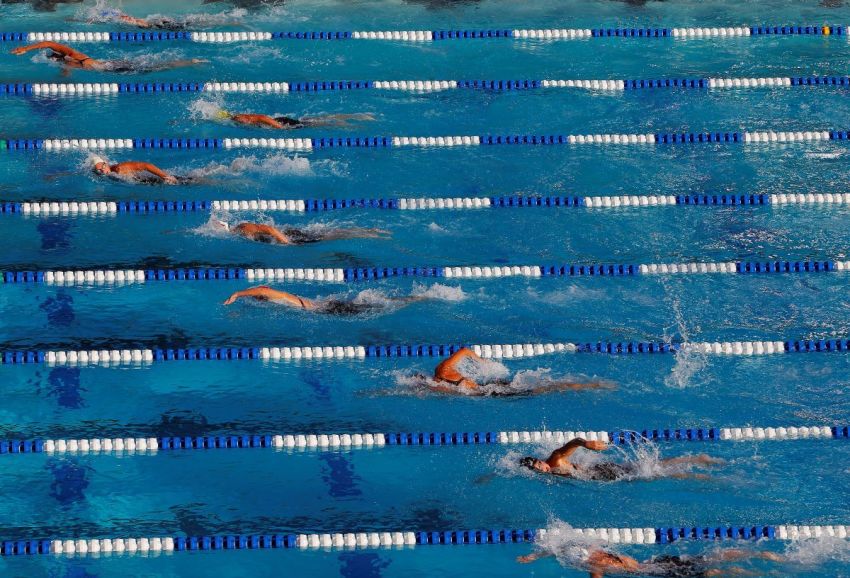Another trans swimmer breaks women's swimming record after 3 years on the men's team

The debate about the fairness of allowing biological men who identify as women to compete in women’s sports has resurfaced again after another trans-identified biologically male swimmer broke a women’s swimming record.
At the Cougar Splash Invitational in Pennsylvania last weekend, trans-identified swimmer Meghan Cortez-Fields of Ramapo College of New Jersey won first place and broke a school record in the 100-yard butterfly, finishing more than 2 seconds ahead of the second-place finisher. Cortez-Fields also won first place in the 200-yard individual medley and second place in the 200-yard butterfly.
Cortez-Fields competed for three seasons on the Ramapo men's swimming team and recently told Ramapo News that former University of Pennsylvania swimmer Lia Thomas was an inspiration. Thomas became an All-American and broke records when he joined the women's swim team after competing on the men's team for three seasons.
Riley Gaines, a former collegiate swimmer who made national headlines for speaking out against allowing trans-identified males to compete in women’s athletics, took to X Sunday to remark that “Ramapo college swimmer in [New Jersey] goes from less than mediocre male swimmer to a record smasher competing against the women.”
Gaines, who competed against Thomas during her senior year, asked, “Where have we seen this before?"
Ramapo College swimmer in NJ goes from less than mediocre male swimmer to a record smasher competing against the women.
— Riley Gaines (@Riley_Gaines_) November 19, 2023
Hm, where have we seen this before? #SaveWomensSportspic.twitter.com/4py4cHokkJ
While Gaines did not identify the swimmer by name or elaborate on the extent of the athlete’s record-breaking performance, she did share several pictures of the athlete, including one of a tattoo on the college student’s arm. The tattoo featured what appeared to be a person with both a male and female head as well as breasts and male genitalia.
“How can you see this tattoo on his arm and not think this is a hyper-fetishized & sexualized movement?” she asked. “As a Christian, I believe we are all made in the image of God and this is a mockery of that.”
In a subsequent post, Gaines noted that “the Ramapo College Instagram account that posted the photo of the male swimmer has now deleted the post.” She said, “They always hate the public attention after being called out for their discrimination and mistreatment of women.”
The Ramapo College Instagram account that posted the photo of the male swimmer has now deleted the post
— Riley Gaines (@Riley_Gaines_) November 19, 2023
They always hate the public attention after being called out for their discrimination and mistreatment of women https://t.co/nqQNDAuCUP
While Ramapo College may have scrubbed references to the trans-identified male athlete from its Instagram page, the school has a statement outlining the women’s swim team’s performance at the Cougar Splash hosted by Misericordia University in Dallas, Pennsylvania, posted on its website.
“The meet was highlighted by Meghan Cortez-Fields who won the 100-yard butterfly with a new program record time of 57.22 seconds. Cortez-Fields also won the 200-yard IM out-touching the second place finisher in 2:12.05,” the school announced.
Cortez-Fields is listed on the Ramapo College men’s swimming rosters for the 2021 season as well as the 2021-22 and 2022-23 school years.
Critics contend that allowing trans-identified males to compete in women’s sports puts biologically female athletes at a disadvantage in light of the biological differences between men and women that give men, on average, an advantage in athletics.
USA Powerlifting, which implemented a policy requiring athletes to compete in competitions that align with their biological sex as opposed to their stated gender identity, has identified “increased body and muscle mass, bone density, bone structure, and connective tissue” as factors that give biological males an advantage over their female counterparts in athletics.
A study published in the British Journal of Sports Medicine in 2020 found that trans-identified male athletes maintain an advantage over their biologically female athletes even after two years of hormone use.
Concerns about the implications of allowing trans-identified males to compete in women’s sports have prompted 24 states to require trans-identified athletes to compete on sports teams that correspond with their biological sex rather than their gender identity.
Other sports governing bodies at the national and international levels have taken similar actions.
British Rowing established a women’s category reserved exclusively for biological females. At the same time, World Aquatics and the World Boxing Council have prohibited trans-identified male athletes from competing in women’s events as they have allowed trans-identified swimmers to compete in an “open” category.
A survey of 1,011 U.S. adults conducted by Gallup earlier this year revealed that just 26% of respondents believed that “transgender athletes should be able to play on sports teams that match their current gender identity” while 69% of those surveyed thought that trans-identified athletes should “only be allowed to play on sports teams that match their birth gender.”
Ryan Foley is a reporter for The Christian Post. He can be reached at: ryan.foley@christianpost.com



























